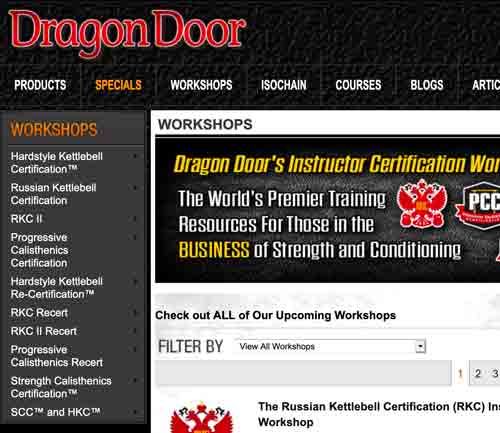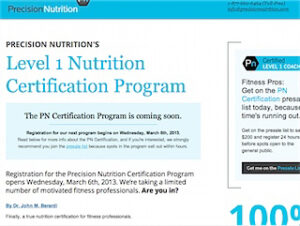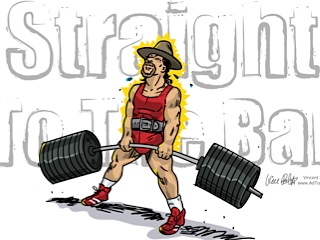I love finding out more about the people here – their training, background, ideas and goals. Always fascinating.
This time it’s in the form of an interview with a particularly inspiring Personal Trainer, Vic Magary. As you’ll see, he’s got an incredible outlook on the world.
Let’s dive in.
1. Firstly, a bit of background. What is your name (and nickname), and where did you grow up?
My full name is Victor Nicholas Magary. Nearly everyone calls me Vic. I grew up in the small river town of Steubenville, Ohio in the United States.
2. I believe you’ve been studying Martial Arts in one form or another since you were 10 years old. How did you move from student to teacher (in the form of a Personal Trainer)?
My first exposure to teaching came during martial arts classes, even when I was still a kid. I was the 13 year old terror that my instructor put in charge of leading the warm up exercises at the beginning of each class. I was all too happy to tell guys in their thirties to drop and give me 50 push ups because they weren’t staying focused in class.
Moving into the personal trainer realm didn’t come until after I finished my time in the Army. I started out making “house calls” and going to the homes and offices of clients to put them through their sessions. My equipment at the time consisted of a pair of Powerblock dumbbells, boxing gloves, and focus mitts.
3. Following the closure of your gym, you shifted focus to offerings such as 31 Day Fat Loss Cure and the Rebel Strength Guide. What are your goals like now – a return to a physical space in some way, or are you enjoying the online life?
I have no plans to ever return to the physical space. I can help more people with far less overhead costs online. I now have a few documented cases of people losing 100 lbs or more via my online programs – I never accomplished that in my physical gym. I am considering offering one-on-one coaching and personalized program design via email and telephone support, but that is the closest I plan on coming to doing individual training.
4. What changes in commercial gyms (and the way they are run) have you seen over the past few years? What would you like to see?
I currently use a commercial gym. It allows members 24 hours access via electronic key entry and there are absolutely no high pressure sales tactics. I love it. I’ve been turned off from large corporate gyms previously from being bombarded with personal training packages and other upsells.
I would love to see more access to “odd object” equipment in a commercial setting. Things like sandbags and a designated sledgehammer area would be great. But I understand that the overall demand for such training implements is relatively low and the commercial gyms will always lean toward providing the unfortunately popular eliptical machines and treadmills.
5. What advice would you offer to someone who’s about to open their own gym?
Get your policies and procedures established – in writing – for EVERY aspect of your business before opening your doors. And I mean everything. Marketing, sales, employee training and evaluations, services. . . all the way down to cleaning the bathrooms. Every action that needs to happen in the gym needs to be boiled down to a checklist in a procedures manual.
And watch your statistics like an airplane pilot would watch his dashboard. At a minimum, tracking should include incoming leads (phone calls, email inquiries, and online registrations), appointments set, appointments kept, and sales closed. I know every gym owner wants to help people get fit – but you can’t help anyone when your doors get closed because you didn’t mind your business metrics.
Also, have much more cash on hand than you think you need. What ever you thing your cash flow needs will be – triple it. That’s not a misprint. TRIPLE what ever you think your cashflow needs will be, at least for the first year and until you have a handle on your true financial statistics.
6. How have your workouts changed over the years, and what are your goals in this regard?
If anything, my workouts have gotten shorter over the years. Like many people when they first start training, I was doing hour plus sessions. Now most sessions take me 20 minutes or less. There are certainly exceptions to this – especially when strength training and taking longer breaks between sets – but even my longest sessions now are done in 45 minutes.
Also, if I’m moving weight in the gym then the session is going to start with a basic lift – and likely in a strength training mode of heavy weight and low reps. That means nearly every session starts with heavy squats, deadlifts, or overhead pressing.
7. Your diet – particularly in the Daily Meals & Training PDF – looks clean to say the least. What’s your long-term goal for this; are there any things you consume now that you’d actually like to cut back, or get rid of altogether?
My dietary goals flux with my training goals. Especially for body composition, I’ve definitely noticed that I have to be much more meticulous with diet as I’ve gotten older if I want to get very lean. But also as I’ve gotten older (turning 40 this year), I question the purpose of walking around with “six pack abs” all of the time. I think there is an intersection of performance and aesthetics that does not necessarily include sub 10% body fat.
8. Your ‘cheat days’ are also pretty clean. How often do you have days like this, and what’s your thinking behind them?
Again, it depends on the training goals at the time. If I’m working on strength and/or size I don’t worry about eating an occasional cheeseburger. If I’m trying to get lean, then I prefer to not use cheat days.
I view cheat days as more of a mental/emotional break from a strict diet. I personally do not buy into the “starvation mode” fears that are sometimes perpetuated with the advocacy of cheat days. Unless you’re looking at mid-to-low single digit body fat percentages, I personally think you’re pretty clear of any sort of “starvation mode” risks.
9. What are your thoughts on Intermittent Fasting? Is it a regular part of your diet, or just something you’re currently experimenting with?
I’ve experimented with Intermittent Fasting with good success. Not only do I feel it helps me get lean, but I enjoy the mental discipline of going a day without food. I’ll go as far as saying there can be an emotional and even spiritual component when we take the time to realize that not everyone gets to nourish themselves when their whim dictates it’s time to eat. It’s easy to take your next meal for granted when it’s as close as the corner grocery store.
10. Are there any parting thoughts you’d like to share with our readers?
Stick to the basics and don’t get caught up in looking for magic formulas. I can boil down how to achieve nearly any fitness goal is four simple sentences:
- Eat real food.
- Train outside of your comfort zone.
- Allow for adequate rest and recovery.
- Repeat with consistency.
That’s it! Don’t complicate things. Move and eat in a manner that enhances your experience of life for the short time we have it.
Fantastic Vic, I really appreciate you taking the time to answer all of these. Thank you.
For more on the incredible Vic Magary, swing by his blog (vicmagary.com), and catch him on Google+ and Twitter. You can also read his articles here, and ebooks such as the 31 Day Fat Loss Cure and the Rebel Strength Guide we mentioned earlier. Brilliant.












0 Comments
Trackbacks/Pingbacks